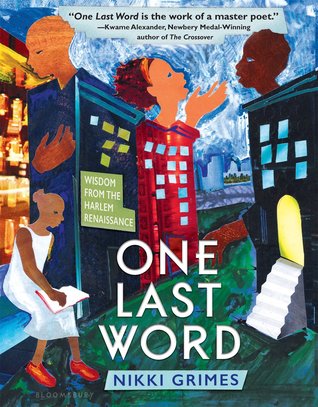One Last Word: Wisdom from the Harlem Renaissance
by Nicki Grimes
Bloomsbury, January 3, 2017
review copy provided (thankyouthankyouthankyou) by the publisher
There is so much to love about this book!
First of all, it is a tribute to the Harlem Renaissance poets. A brief history of the movement begins the book, and there are short biographies of each of the featured poets in the end matter. The importance of this literary movement, in light of current events, should be one we remember and study and celebrate.
"These literary lights, writing at a time when the lynching of black men filled the news, were more than familiar with racial profiling, racial violence, and every variety of injustice imaginable. Yet they ascended to great heights in spite of it all...Above all, they understood how to make the most of their freedom, despite living in a nation that had not then, and has not yet, fully realized its promise of freedom and justice for all." --Nikki Grimes, in the forward "The Harlem Renaissance"
Also of note are the gorgeous illustrations. Fifteen illustrators contributed to make this book as vibrant in pictures as it is in the words. Short biographies of the artists in the end matter highlight the talents of these illustrators.
Far and away the most amazing thing about this book is the unique (and challenging!) form in which Nikki Grimes writes her poems of tribute -- the "Golden Shovel." For each of Grimes' poems, she takes a line (or sometimes the whole poem) and uses each of the words as the last word in her poem. Hence, the title of the book.
For example, the line "A thousand hearts echo the sigh" from Clara Ann Thompson's poem, "The Minor Key" is followed by this poem by Nikki Grimes:
COMMON DENOMINATOR
by Nikki Grimes
Anger is a hard itch to scratch; laughter a
secret tickle we let out in a thousand
sneezes, sometimes to camouflage cracked hearts;
love, envy, fear--we all hear their echo.
Peel us to the core, we're indistinguishable. Press the
solar plexus of any, you'll hear the selfsame sigh.
I gave this form a try, using the poem "Nothing Gold Can Stay" by Robert Frost. I liked adding to a poem of submission an element of strength and endurance.
NOTHING GOLD CAN STAY
by Robert Frost
Nature’s first green is gold,
Her hardest hue to hold.
Her early leaf’s a flower;
But only so an hour.
Then leaf subsides to leaf.
So Eden sank to grief,
So dawn goes down to day.
Nothing gold can stay.
WE ARE HERE TO STAY
by Mary Lee Hahn
We'll begin again from scratch, with nothing.
There is not enough gold
in all the coffers of the world that can
stop us. We are here to stay.
Buffy has the Christmas Eve Eve edition of the Poetry Friday roundup at
Buffy's Blog. Happy Christmas/Hanukkah/Kwanza to you!




